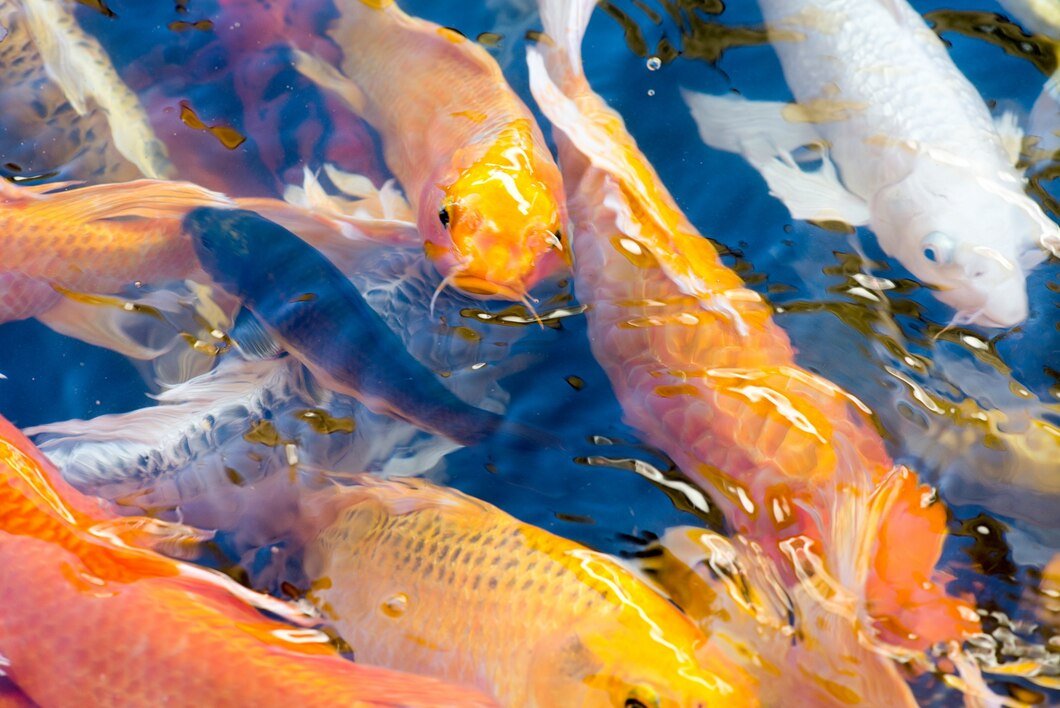Koi ponds are a mesmerising blend of tranquillity, colour, and life, providing an enchanting focal point in any outdoor space. These stunning and highly-prized fish captivate the hearts of their keepers with their striking patterns, graceful movements, and individual personalities. As one of the UK's largest aquatics specialists, we at Perfect Aquatics understand the importance of providing premium care for your cherished koi, ensuring they remain healthy, vibrant, and happy. A vital aspect of this care is the provision of optimal nutrition, encompassing feed selection and feeding practices grounded in expertise and passion for the well-being of your fishy friends.
In this comprehensive guide, we delve into the world of koi nutrition, exploring the key elements necessary for sustaining the health and vibrancy of your fish. Uncover the importance of a balanced diet rich in essential nutrients, vitamins, and minerals, and learn how to choose the most suitable feeds for your koi's specific needs. Equip yourself with the knowledge to master feeding techniques and regimes that promote growth, enhance colouration, and support the immune system. Armed with this information, you will possess the essential tools to nurture your koi, maximising their health, happiness, and beauty.
Together, let's embark on a fascinating journey into the realm of koi care, delving deep into the intricacies of nutrition and feeding practices. With our guidance, expertise, and commitment, you will emerge confident and capable, poised to provide unparalleled care and support for your exquisite koi. In doing so, your pond will remain a stunning water oasis teeming with life, grace, and vibrant colour, captivating the hearts and imaginations of all who encounter its spellbinding presence.
Selecting the Right Koi Feed for Optimal Nutrition
Providing a balanced diet tailored to your koi's specific needs is critical for promoting their health and wellbeing. Consider these factors when selecting the appropriate feed:
- Nutrient Composition: Choose koi feeds containing a comprehensive blend of essential nutrients, including protein, carbohydrates, fats, vitamins, and minerals. High-quality feeds should prioritise easily digestible sources of protein and energy, such as fish meal and wheat germ.
- Colour Enhancing Ingredients: Opt for feeds containing natural colour-enhancing ingredients, such as spirulina and astaxanthin, which promote vibrant colouration without compromising your koi's health.
- Feed Formulations: Explore various formulations designed for specific purposes, such as growth promotion, immune system support, or temperature-resilient feeds to accommodate the changing seasons.
- Product Quality: Invest in premium-quality koi feeds from reputable manufacturers to ensure consistency, nutritional value, and safety.
Mastering the Art of Koi Feeding Practices
Implementing proper feeding practices enhances your koi's health, happiness, and vitality. Keep the following tips in mind:
- Feeding Frequency: Feed your koi 2-4 times daily during warmer months, gradually decreasing the frequency as water temperatures drop in colder seasons.
- Portion Control: Offer appropriate amounts of feed your koi can consume within a few minutes, reducing waste and preventing water quality issues.
- Monitoring Appetite: Regularly observe your koi's appetite and adjust feeding accordingly, as sudden changes in eating habits may indicate underlying health concerns.
- Avoid Overfeeding: Overfeeding may lead to digestive issues, excessive waste production, and poor water quality, all of which can negatively impact your koi's health.
Adapting Koi Nutrition to Seasonal and Environmental Changes
To ensure optimal koi nutrition and health throughout the year, adapt your feeding strategies in response to seasonal and environmental changes:
- Spring and Autumn: Transition your koi to wheat germ-based feeds during cooler months, as these contain easily digestible nutrients suited for temperatures between 10°C and 15°C.
- Summer: In warmer months, when water temperatures are consistently above 15°C, increase protein intake with growth-promoting feeds to support energy levels and muscle development.
- Winter: Reduce feeding frequency or cease feeding entirely if water temperatures drop below 10°C, as koi metabolism substantially slows down, and they consume less food.
- Water Quality Management: Regularly monitor and maintain water quality parameters, such as pH, ammonia, and nitrate levels, to provide a healthy environment that allows your koi to thrive.
Supporting Koi Health through Supplementary Feeding Techniques
Incorporate supplementary feeding techniques to strengthen your koi's immune system and provide essential nutrients not present in commercial feeds:
- Natural Foods: Live or freeze-dried sources of protein, such as shrimp, daphnia, or bloodworms, may be offered occasionally to supplement your koi's diet and boost overall nutrition.
- Vegetables and Fruits: Fresh, cleaned vegetables like lettuce, spinach, and peas, or safe fruits such as watermelon and oranges, can provide additional vitamins and minerals for a well-rounded diet.
- Vitamin and Mineral Supplements: Sprinkling specially formulated multi-vitamin and mineral supplements onto koi feed can further enhance their nutritional intake and overall health.
Conclusion
Embracing a holistic approach to koi nutrition empowers you to raise healthy, vibrant fish that are a true delight to behold. By carefully selecting premium feeds, mastering feeding practices, adapting to seasonal and environmental changes, and enhancing your koi's diet with supplementary feeding techniques, you can provide optimal care for these exquisite ornamental fish.
Allow the experts at Perfect Aquatics to guide you in your koi care journey, furnishing you with the knowledge and resources necessary for achieving outstanding results. Together, let's nurture thriving, enchanting koi ponds that provide joy, peace, and wonder for all who encounter their mesmerising beauty and grace. Contact us today!

